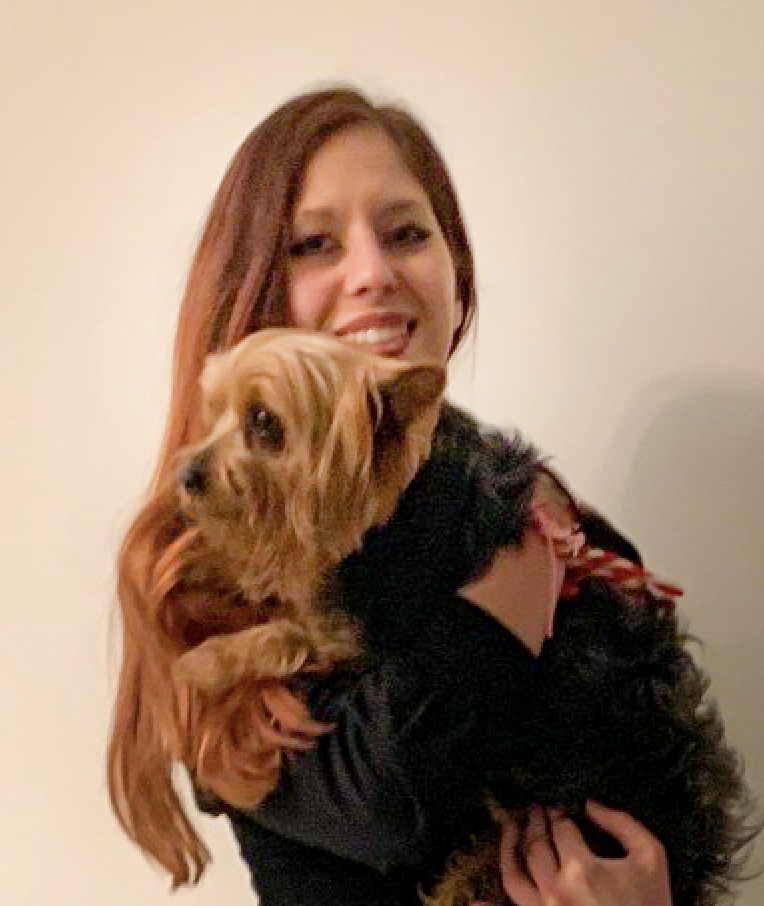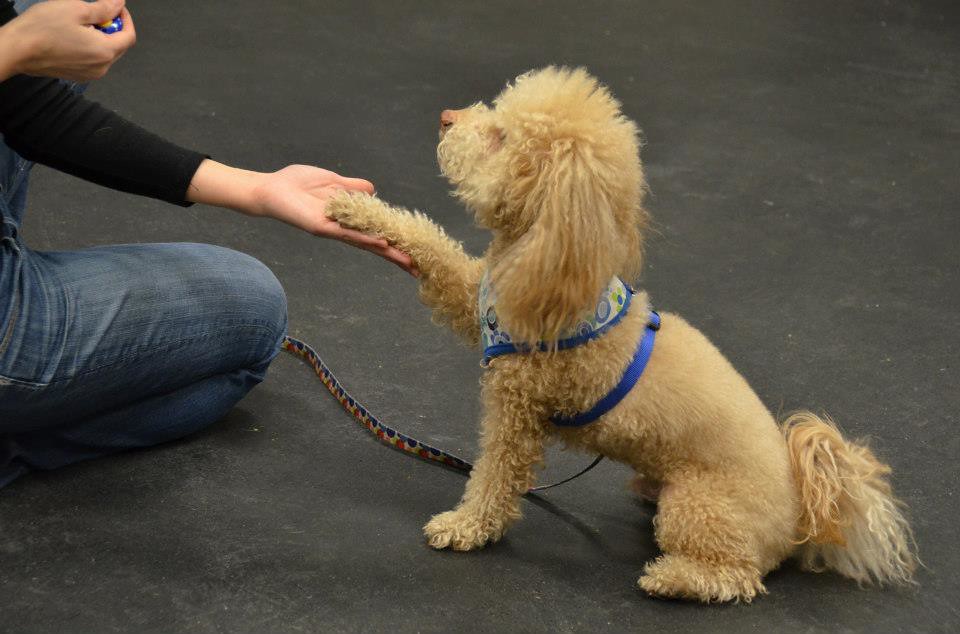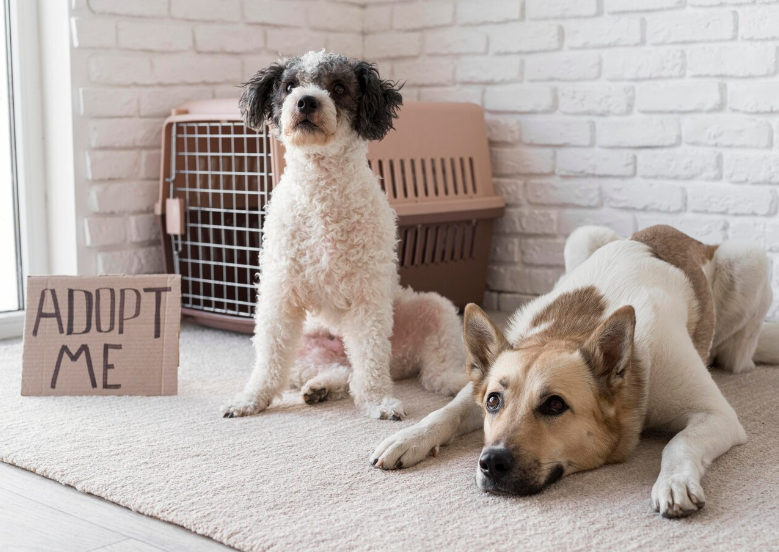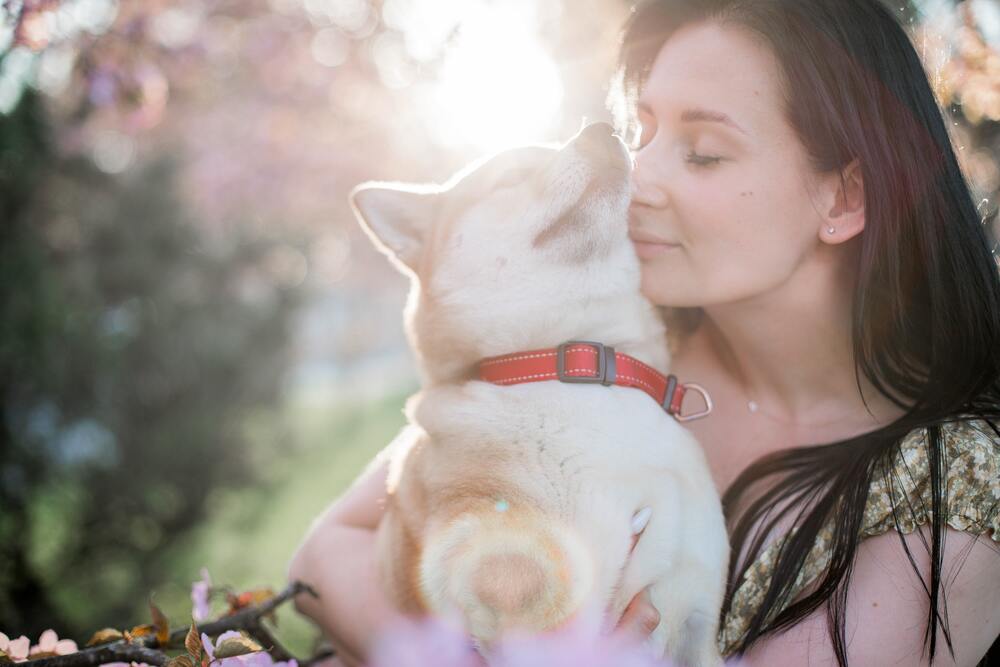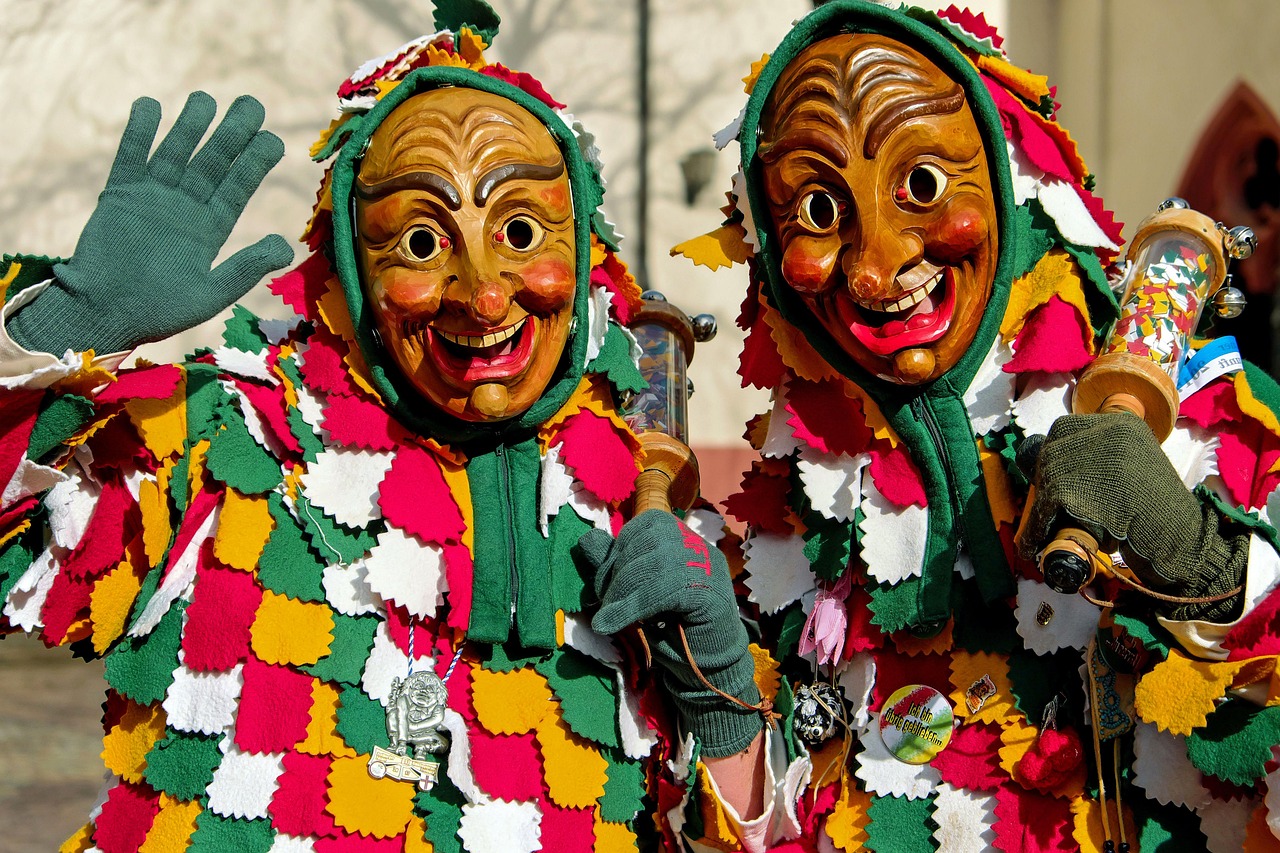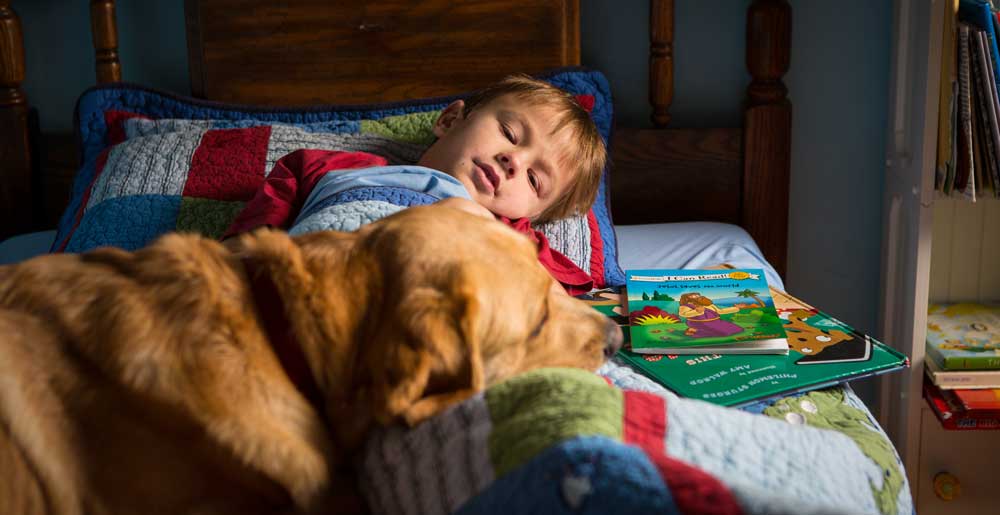
Dogs can play various roles in our lives—whether as pets, companion animals, or service animals. One thing we can all agree on, regardless of their function, is that dogs provide us with immense love and make us happier. Based on our needs, expectations, and lifestyle, we choose different breeds to ensure that our future paw friend will suit our personality and lifestyle.
Many people coping with a disability (physical and/or mental) or in need of emotional support choose to welcome a dog into their family. Additionally, many parents decide to get a service or companion dog for a child coping with Autism.
Autism, or Autism Spectrum Disorder (ASD), is a wide range of conditions characterized by challenges in speech and non-verbal communication, social skills, and the presence of repetitive behaviors.
According to the Centers for Disease Control (CDC), "about 1 in 31 (3.2%) children aged 8 years has been identified with ASD".
How a dog can benefit a child with Autism and how to choose the most suitable breed are two of the questions we will answer in today’s article.
How Dogs Can Help Children with Autism?
Dogs as Service Animals for Children with Autism
According to the Americans with Disabilities Act (ADA) service animals are dogs, individually trained to perform specific tasks for the benefit of a person with a physical or a mental disability. The tasks that the dog performs must be directly related to the individual’s disability. The ADA protects service dogs and their handlers/users by providing them with public accommodation rights and prohibiting any kind of discrimination against them.
Based on the definition of a 'service animal', a dog must be trained to perform specific tasks for a child with Autism, to be considered a service dog. Some essential tasks that a service dog for Autism can be trained to perform are:
-Preventing the child from performing self-harming behaviors, i.e. by interfering with the child’s access to a potentially harmful object;
-Using their own body to protect the child from falling and helping them keep balance;
-Grounding the child and calming them down when they have an episode. Grounding is a technique that may include licking, pawing, nose-nudging or other types of tactile stimulation to bring the service dog handler/user back to reality;
-Tracking and locating the child if they are prone to wandering off;
-Retrieving items, such as medication;
-Providing Deep Pressure Therapy by laying on the child's lap or resting their chin on the child's lap (based on the dog's size);
-Providing crowd control, etc.
There are many tasks that a service dog can be trained to perform. They depend on the needs of the service dog user and can be adapted during the process of training.
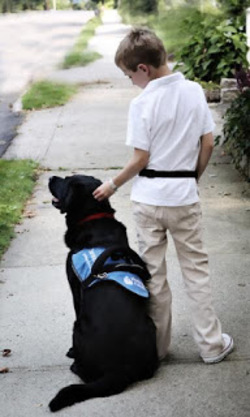
Dogs as Companion Dogs for Children with Autism
The term “companion dogs” refers to dogs that are not trained to perform specific tasks for the benefit of a person with a disability. These dogs provide comfort and companionship to their handler or user, but they are not trained in specific tasks. As such, they do not have the same rights as service dogs and may be denied access to public places. Whether they are allowed on certain premises depends on local laws and the policies of the management.
However, these dogs still need to undergo basic obedience training to ensure they are well-mannered in public. Types of companion animals include Emotional Support Animals (ESAs) and Therapy Animals. They can be not only dogs but also other domesticated species, such as cats, rabbits, birds, etc.
The presence of a companion dog/animal in the life of a child with Autism can be highly beneficial, as the animal can help calm the child when they feel anxiety, fear, or frustration. Although companion animals are not protected under the ADA, they do have guaranteed rights under the Fair Housing Act. If you rent a house or apartment and would like to bring an Emotional Support Animal to support your child, you have the right to do so. In this case, a letter from a mental health professional may be required to verify the need for an ESA. For more information, you can read the paragraph below, quoted from the ADA National Network:
Dogs as Pets for a Child with Autism
Although dogs as pets do not have public accommodation rights, they can still provide significant benefits for a child with Autism. Through interactions like petting, feeding, grooming, and even talking to the dog, the child may improve social and verbal skills. Some researchers suggest that autistic children develop a strong emotional bond with their dogs and become more confident after spending time with them. Needless to say, the emotional state of people who have dogs improves significantly, even simply through the presence of the dog itself.
Many of you may have already recognized the benefits a dog can bring to the life of a child with Autism. You may now be wondering what qualities a dog should have to serve as a good companion or service dog for your child.
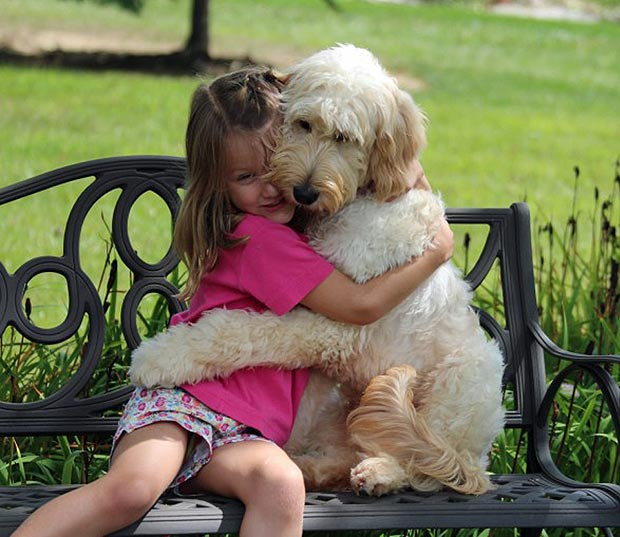
Breed Traits To Look For
We will list some physical and personal traits that a dog should possess in order to provide comfort or be able to perform specific tasks for the benefit of a child with Autism.
Intelligence
Although dogs should be monitored as individuals, there are certain breeds recognized as smarter than others. They are considered quick learners and are likely to retain important information more effectively than other breeds. Intelligence is extremely important if you are looking for a service dog, who will perform various tasks.
Friendly Personality
Another essential feature that you should look for in your future dog. Since you are expecting the dog to spend much time with your child, you may want to ensure, that he/she has a friendly and non-aggressive behavior towards people and other animals and your child will be safe.
Gentleness
The dog who will provide companionship to your child or perform specific tasks for his/her benefit must be affectionate. Some dogs tend to play more roughly and even when they do not intend to hurt anyone, they may do it accidentally.
Trainability
If you are looking for a service dog, he/she needs to be trainable. How important this trait is, depends on how demanding tasks the dog may need to perform. In any case, it will benefit more from a dog, who can be trained at least basic obedience tasks.
Eagerness to Please their Owner
Some dogs are more independent than others, so you may need to find a dog, who will develop a strong bond with your child and the other family members. Dogs who are eager to please their owners are more likely to get attached to them and recognize behavioral and emotional changes when they occur.
Large Breed
The qualities of the small breed representatives are indisputable, however, a child with Autism may benefit more from a dog of a large breed. Dogs of larger breeds can better protect the child and interfere with harmful behaviors. Also, the tactile stimulation they provide will be more intense. Last but not least, you are likely to feel calmer knowing that your child is being protected by a large dog.
How to Train a Dog for Autism
As a first step, you need to answer the question: “What type of dog does my child need?” If you are interested in getting a companion animal for your child, the training process will be much easier, as the dog will mainly need to go through basic obedience training. Of course, the process may not be as simple as it sounds. You will still need to invest time and effort if you want to handle the training yourself.
There are many online resources that include lessons and guidance on how to train a dog to provide companionship to a child with Autism. You should remember that both the dog and the child need to learn how to interact with each other. Hence, you should be prepared to include your child in the training at some point. You may want to review our Certified Companion Dog Training Course for Children with Autism. It focuses on basic obedience commands, socialization, and also includes helpful tips on how to help develop a strong bond between the child and the dog.
If you don’t feel prepared to take on the role of a dog trainer, you can consult a professional trainer or an organization near you.
If you are looking for a service dog to perform specific tasks, a a training program like the Psychiatric Service Dog Course may be the right fit for you. The tasks it includes are verstile and can be beneficial for indioviduals with mental and developmental health issues. The program includes tasks such as Deep Pressure Therapy, tactile stimulation, prevention of emotional overload, crowd control, interrupting repetitive behaviors, finding an exit, guiding the owner to a safe place, alerting to anxiety, waking up the owner from nightmares, reminding the owner to take medication, and retrieving items. You can review the learning plan in the Syllabus.
The Americans with Disabilities Act (ADA) allows dog owners to train their own service dogs. If you believe in your capabilities and are ready to invest the time and demonstrate discipline, patience, and consistency, you can train a service dog yourself. However, you must remember that your child will be the service dog user, so they will need to be engaged in the training process or at least in active interaction with the dog. As mentioned above, both the dog and the child will need to learn to understand each other and interact properly.
Since owner/self-training a service dog requires patience, consistency, and determination, it’s not everyone’s cup of tea. Some people decide to seek help from professional trainers and organizations.
If this is the case for you, it’s important to first clarify what tasks you would like the dog to perform. After the initial consultation, you will likely receive guidance on the next steps. A professional trainer will be able to advise you on the breed that would suit your and your child’s lifestyle and needs, as well as the training the dog will require. Keep in mind that getting a professionally trained service dog can be very expensive—up to $20,000–30,000—and many people may be discouraged by this cost. However, you can discuss deferred payments and fundraising options if available.
Another option is to contact a non-profit organization. However, be aware that there are long waiting lists, and you may need to wait one or several years to get a dog.
Most Suitable Breeds for Children with Autism
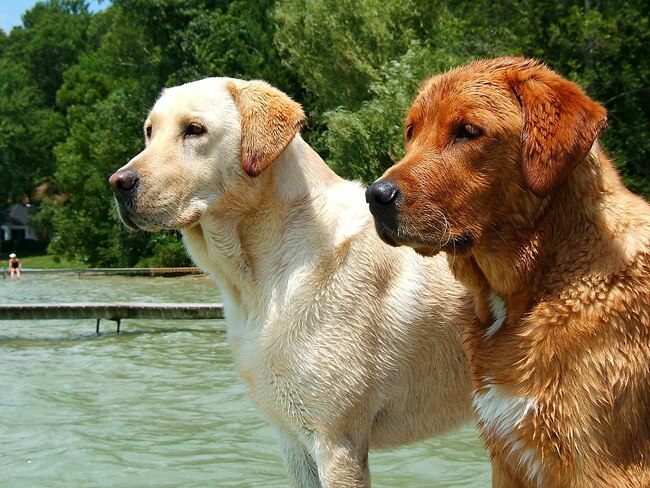
Labrador and Golden Retriever
These two breeds are known for their qualities as great service and companion dogs. They are gentle, intelligent and highly trainable. Their friendly, loving and positive personality makes them great family dogs. Moreover, they are medium to large of a size, and will be able to protect your child if he/she has balance issues or tends to perform harmful behaviors. You should keep in mind that these doggies are energetic and you will need to provide them with a lot of space at home. If you live in a small apartment you should walk and exercise them enough, so they can spend the excessive amount of energy. The Retriever representatives are moderate shedders, but if you or other family members are allergic to fur, this breed feature should be considered.
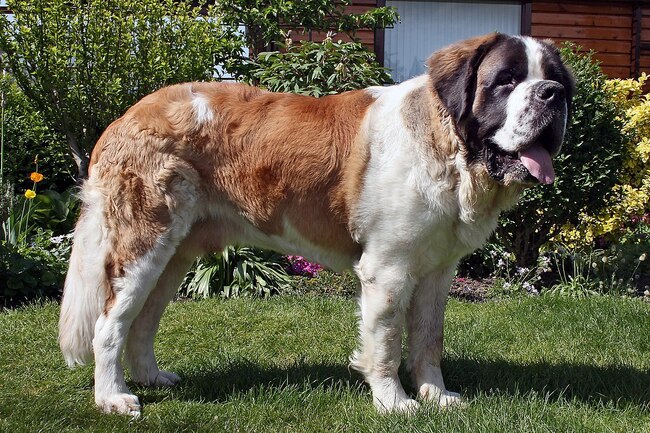
Saint Bernard
These giant fluffy bears are very affectionate and patient. They are also very loyal and can provide great companionship to children with Autism. The Saint Bernards can become great watch and guard dogs, so you can be confident that your child will always be protected. Similar to the Retriever representatives, these dogs are considered moderate shedders. However, during the spring and autumn seasons, you can expect them to shed more actively.
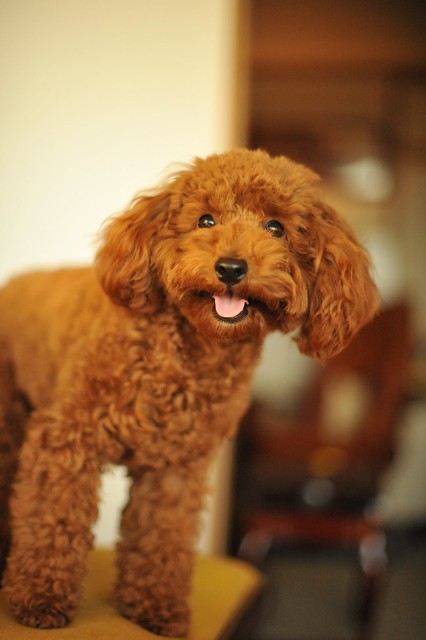
Poodle
Poodles are welcome by many people due to their gorgeous look and intelligence. A fluffy cute coat and capabilities to learn new skills and tasks- what else do you need in a dog? The breed is considered hypoallergenic, which is perfect for those of you who are allergic to dog fur. There are different types of Poodles based on their size- a Standard, Medium, Miniature and Toy Poodle, so you can choose the size that will suit your child’s needs the most. Also, Poodles are very gentle and eager to please their owner.
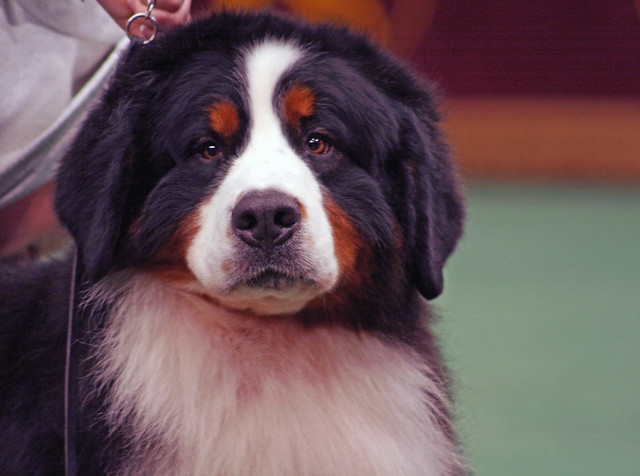
Bernese Mountain Dog
Gentle, intelligent, attached to their owner, and eager to please them. The Bernese Mountain Dogs are another great choice for parents, who are looking for a service/companion dog for their child with Autism. These doggies are open to new people and tend to be quite playful. However, you need to consider their shedding level, as they shed moderately all over the year and quite a lot in the spring and fall. These doggies are very adaptive, but we would recommend that you provide them with enough space to explore and a lot of exercises.
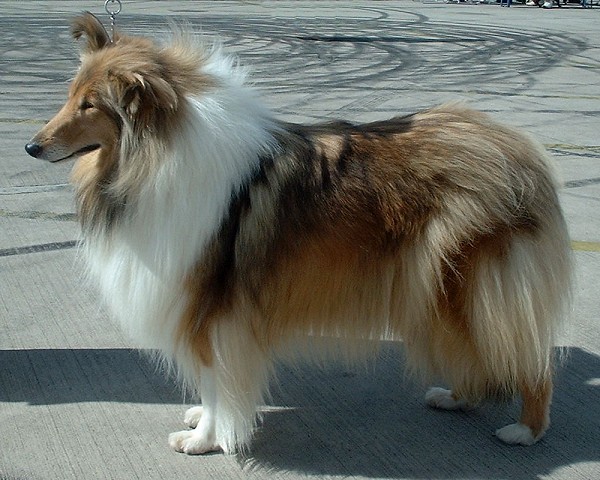
Collie
Do you remember the “Lassie” movie and the cute intelligent dog, who starred there? It was a representative of the breed Collie. These doggies are very affectionate, develop a strong bond with their owner and get along with children as well. Highly trainable, adaptive, and playful, they can become great family dogs. However, you should remember that the Collies can be highly vocal. If you are not into barking breeds, this one may not be the most suitable for you. On the other hand, if you are looking for a dog to bark as part of a task, these canines may be a fit for you. The Collies are considered moderate shedders, so you should get used to noticing a certain amount of their silky lovely coat on your furniture and clothes.
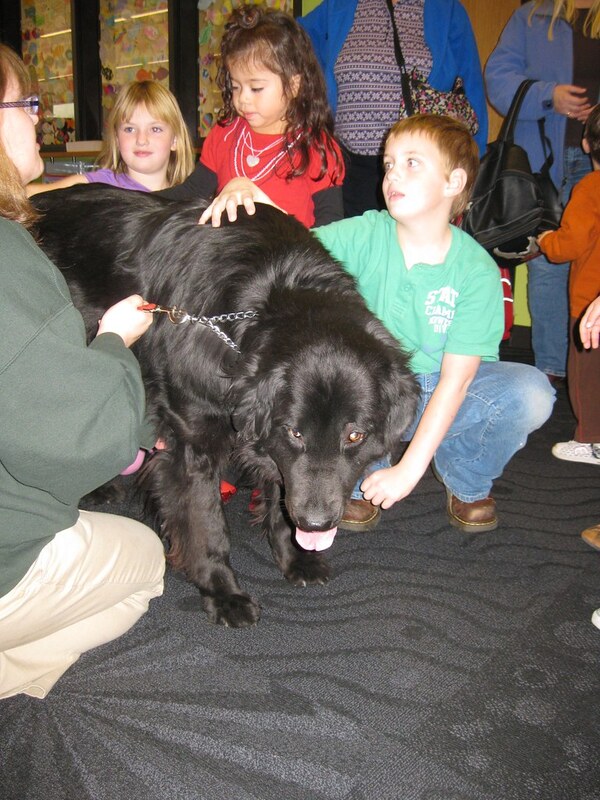
Newfoundland
Fluffy, large and loving- these canines, similar to small bears, can become great family dogs. Gentle and attached to their owner and other family members, these doggies get along with children and provide great companionship. They are open to new people, playful and very adaptive. If you want to raise a representative of this breed, you should know that these canines do shed moderately and drool a lot. However, you will be happy to know that these canines can become wonderful guard/watch dogs and are known as barkers.
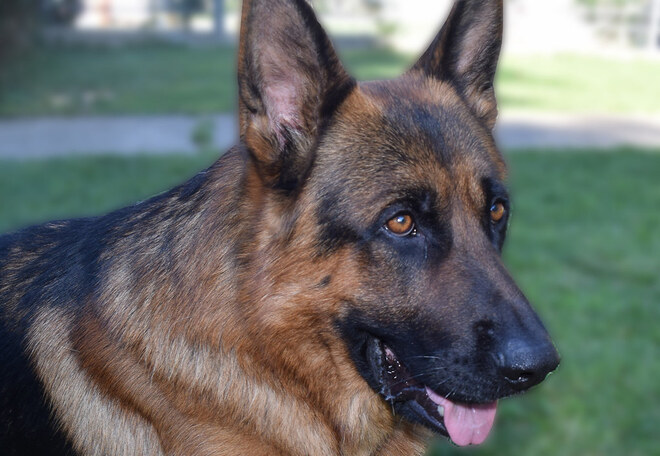
German Shepherd
What breed comes into your mind, when you hear the word “trainability”? It is the German Shepherd, isn’t it? These canines are known for their intelligence, loyalty and high trainability. They can become both great companions and service dogs. There are no tasks that these smart dogs can not perform- mobility, guidance, psychiatric tasks...etc. They are eager to please their owner and will be happy to face daily challenges that keep them physically and mentally fit. Needless to say, they can be wonderful watch/guard dogs.
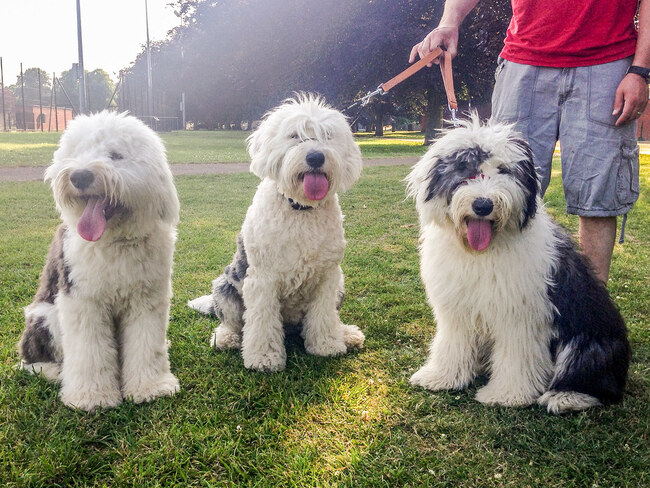
Old English Sheepdog
These cute balls of fur are very gentle and attached to their family. The breed representatives are trainable, adaptive, and get along with children. You can rely on these doggies to be your child’s loyal friends and watch over him/her. If you choose an Old English Sheepdog as a companion/service dog, you need to prepare to invest some time in maintaining their coat, as they require above average maintenance. These doggies do bark, and some representatives could develop barking issues if not trained properly. We would recommend that you exercise and mentally stimulate your furry friend to avoid any behavioral issues that may occur out of boredom and an excessive amount of energy.
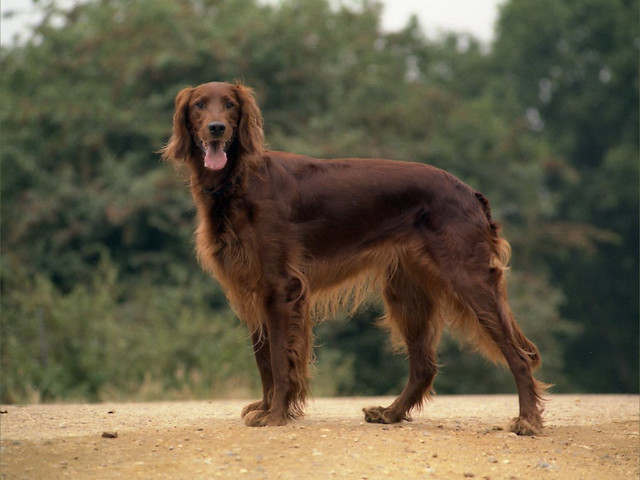
Irish Setter
If we could rank the capabilities of these dogs in the category “Gentleness with the family members”, we would give them 10/10. The Irish Setters are very affectionate to their owner and other family members and get along with small kids as well. These canines are known for their intelligence and trainability. However, if you are actively engaged in the training process, you should remember to be firm, but consistent and do not let your paw friend take the lead. The Irish Setters are highly energetic, thus need a lot of exercises and mental stimulation. These dogs are outgoing and very friendly. They are deemed moderate shedders, so you will have to get used to some dog’s hair on your furniture.
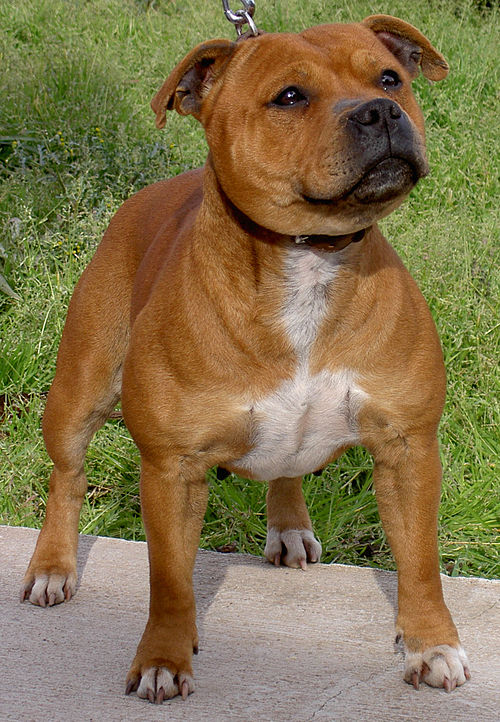
Staffordshire Bull Terrier
These dogs are known as affectionate and loving towards people, including children. The nickname “nanny dogs” they earned once, only proves how friendly and gentle they are. Of course, every dog can develop bad habits, if raised and trained inappropriately. Although these canines may shed heavily once a year, they are considered low shedders. They have high levels of adaptability, playfulness and can turn into wonderful watch/guard dogs. These canines are trainable and energetic, and you will need to provide them with enough physical and mental stimulation.

